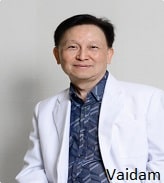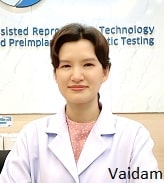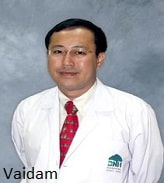The cost Hysterectomy Surgery includes:
Preoperative diagnostic tests cost [Cervical cytology (Pap test), Endometrial biopsy, Pelvic ultrasound, blood tests, etc.]
Surgery cost
Type of Surgery [laparoscopic hysterectomy (keyhole surgery), vaginal hysterectomy, abdominal hysterectomy, etc.]
Post-Operative cost (depends on the number of follow-up sessions)
Medicine cost
Patient's hospital stay
The overall cost of the procedure also varies based on the patient's condition and preferences. Some of these factors are:
Type of hospital and room opted (General, Twin sharing, or single room)
The severity of the disease
Post-surgical complications if it happens (such as infection, bleeding, nerve injury, etc.)
Cost of blood products (if required)
An extended stay at the Hospital
Cost of accommodation during follow-ups, in case the patient is not a local resident
Listing approximate price of Hysterectomy and some related procedures. The prices may change depending upon the centers and condition of the patient.
| Treatment name | Cost range |
|---|---|
| Laparoscopic Hysterectomy | USD 3150 to USD 3850 |
| Laparoscopic Supracervical Hysterectomy | USD 3150 to USD 3850 |
In order to determine the nature and severity of the disease, the surgeon may recommend specific diagnostic procedures such as blood tests, Ultrasound of the Pelvis, Biopsy of the Endometrium, and Cytology of the Cervix. The cost of all the tests are covered in the package.
The pharmacy and prescription costs are covered when a patient is in the hospital. However, if the patient buys prescriptions outside of the hospital, the package does not cover them.
Most women who undergo hysterectomy will stay in the hospital for 2 to 3 days, maybe longer if the hysterectomy is due to malignancy. Depending on the kind of hysterectomy, recovery time might range from 2 to 6 weeks. Check-ups are normally scheduled 6 to 8 weeks after your therapy is completed. For the first two years, every 3 to 6 months.
Listing popular specialists:

Prof. Dr. Kamthorn Pruksananonda
Professor, 39 years of experience

Infertility

Consultant, 25 years of experience

Reproductive medicine

Consultant, 21 years of experience

Microsurgery For Tubal Reversal, Gynaecologic Endoscopy, Laparoscopic Surgery, Hysteroscopic Diagnosis And Surgery, Invitro Oocyte Maturation, As High-Risk Pregnancy, Hypertension In Pregnancy, Hormonal Disorders, Menstruation Problems, Family Planning

Consultant, 38 years of experience

Performing regular exams on women for reproductive health issues, Treat PCOS/PCOD, Endometriosis, Fibroids, Perform normal and C-sec deliveries, Manage high-risk pregnancies, Blood pressure during pregnancy, Hormonal disorders

Consultant, 33 years of experience

Obstetric and Gynaecological Pathology, Gynaecological Oncology.

Senior Consultant, 35 years of experience

Obstetrics and Gynaecology, Gynaecological Oncology.

Consultant, 35 years of experience

Gynaecological Oncology.

Assistant Prof. Phongthorn Virojchaiwong
Professor, 37 years of experience

Gynecologic Laparoscopic Surgery

Director, 43 years of experience

Infertility, Gynecology

Consultant, 35 years of experience

Reproductive medicine

Director, 14 years of experience

PRP for Ovarian Rejuvenation and Endometrial Receptivity, Pre-implantation Genetic Diagnosis

Consultant, 14 years of experience

Fertility Treatment, Laparoscopic and Hysteroscopic Surgery

Consultant, 20 years of experience

Obstetrics and gynecology Laparoscopic gynecology

Consultant, 18 years of experience

General gynecologic, Gynecologic Oncology, Pelvic surgery, Laparoscopy, Hysteroscopy, and minimally invasive surgery

Consultant, 15 years of experience

Reproductive Medicine

Assoc. Prof. Wichai Termrungruanglert
Associate Professor, 37 years of experience

Gynaecologic Oncology

Consultant, 35 years of experience

Gynecologic Oncology

Consultant, 35 years of experience

General Obstetrics & Gynecology Gynecologic Oncology

Consultant, 15 years of experience

High-risk Pregnancy, Gynecological cancer

Consultant, 25 years of experience

High-risk Pregnancy, Gynecological cancer
Our Services for Hysterectomy in Thailand
Transparent - Professional - Without Hassles
During the operation, anesthesia or an epidural could be given so it will not hurt. However, minor cramps and discomfort will be experienced after surgery.
Having a hysterectomy doesn't cause weight loss directly. However, depending on the underlying condition it's treating, some people might experience weight loss that's not necessarily related to the procedure itself.
After a hysterectomy, the other abdominal organs shift slightly to fill the space. Unless extensive surgery is performed the vagina remains the same after a hysterectomy.
Hysterectomy is the surgery which is done for removing the uterus this is also being done for some other reasons such as uterine fibroids, uterine prolapse, cancer of the uterus, cervix or ovaries, chronic pelvic pain or abnormal vaginal bleeding.
There are different types of hysterectomy depending on the reason of hysterectomy surgeon may choose to remove all or only some part of the uterus.
Yes, Hysterectomy is a major surgery but with the new technological advancement the discomfort and the risk of infection of the surgery is being decreased.
Women of any age can get their uterus removed but they should be medically fit for it usually women of age 18 to 35 years should consider for hysterectomy because it is necessary for their well being.
Hospital stay is for 2 days.
It usually takes 1-1.5 hours.
Hysterectomy surgery is mainly done under general anaesthesia. This procedure lasts for about one to two hours.
In Hyterectomy surgery, surgeon makes a 5 to 7 inches incision either up to down and from moving side to side across the belly and the uterus is being removed through this incision. In vaginal hysterectomy the surgeon makes a cut in the vagina and removes the uterus through this and then the incision is closed and no visible scar is being seen.
Laproscopic hysterectomy is being done through then a laparoscope in which a tube lighted camera and a surgical tools is being inserted by making a small cut in the belly. Laproscopic tools are being inserted which helps in removing the uterus. The surgeon performs the hysterectomy from outside the body, viewing the operation on a video screen.
Open Surgery operates on the lower abdomen giving incision cuts on the belly to remove the uterus leaving a scar mark.
To remove the same, a MIP approach involves an incision in the vagina or belly with surgical tools and camera also using sophisticated technical assistance. This leaves no visible scar.
Hysterectomy removes the uterus and the cervix. This procedure leaves the ovaries intact and will not induce menopause.
It takes around 3 – 4 weeks for vaginal and laparoscopy-assisted vaginal hysterectomy whereas abdominal Surgery takes around 4 – 6 weeks.
Wait for 6 weeks after surgery to return to work, assuming it is not manual or lifting. You can drive a car when you are comfortable wearing a seat belt and do an emergency stop.
Once the wounds have healed, you can swim and resume sexual activity once the discharge has stopped.
The only way to enjoy parenthood after hysterectomy is to go for surrogacy.
You can orgasm after a hysterectomy, no changes are being made in the vagina after hysterectomy procedure.
Hysterectomy is considered bad because when the uterus is being removed it can result in bladder and bowel dysfunction, prolapse and incontinence along with the four fold increased risk of pelvic organ fistula.
Hysterectomy is the biggest cause of vaginal shortening because of the removal of the cancerous organs and scarring the vaginal capacity is being reduced.
Yes, it is possible to gain weight after hysterectomy especially for postmenopausal women also those who have full hysterectomy where uterus and cervix were removed
Yes, you may notice that your stomach has become swollen and puffy after Hysterectomy which will take few months to subside and to recover completely.
Depending on various procedures, the individual may be advised to rest from two to six weeks, with the first two weeks consisting of bed rest.
Weight loss is not a side effect of the surgery. Some people may experience some side effects of the surgery which can result in pain or side effects of anaesthesia. This can sometimes results in temporary weight loss.
Pain is very minimum after the surgery, you may feel some pain or tenderness at the incision site most women are advised to avoid lifting heavy objects and to restrict themselves from having sex for minimum three weeks.






NABH Certified Healthcare Discovery Platform
Vaidam is NABH certified healthcare discovery platform that will connect you to top-notch medical experts, hospitals, wellness options, and trusted travel partners to help identify and make the right healthcare choices.

Researched & Personalized Treatment Plan - Under One Roof
You can search for the best hospitals, read about them, view photographs of the facilities at the hospitals and the places at which the hospitals are located, and check the cost of treatment.

Quality Treatment Within Your Budget
As soon as you post an enquiry, the patient relation team will collect details from you, share them with the doctors and hospitals on Vaidam's panel, and get a personalized treatment plan. We research to get quality treatment within your budget.

Treatment to Travel
Vaidam concierge assists patients, to get medical Visa, the best airline fares and arrangements for your stay. Our concierge also helps you with daily travel, language, and food concerns. Vaidam does everything to be your perfect host. All of Vaidam’s services are free of cost to patients.

International Reach
Vaidam Health has network in 15+ countries, which includes India, Turkey, UAE, Germany, South Korea, Thailand, Malaysia, Spain.
Note: Vaidam Health does not provide medical advice, diagnosis or treatment. The services and information offered on www.vaidam.com are intended solely for informational purposes and cannot replace the professional consultation or treatment by a physician. Vaidam Health discourages copying, cloning of its webpages and its content and it will follow the legal procedures to protect its intellectual property